An ERP implementation cost comparison of popular systems
With so many ERP vendors in the market today, it can be overwhelming to gather the information needed to create an accurate ERP cost comparison. It’s especially difficult when ERP vendors limit the amount of pricing data they share online, and pricing models vary. And ERP software pricing is just one factor in the overall ERP implementation cost. There are several other factors to determine an ERP implementation cost, and not all apply to every organization.
In an attempt to demystify the cost analysis for an ERP implementation, we've laid out the factors that determine an ERP implementation cost and also gathered some pricing points related to 3 popular ERP systems.
What determines ERP implementation costs?
Every business has unique requirements for their implementation. So while some may need to consider – for example – the cost of hardware peripherals like point-of-sale devices and receipt printers, others may not and instead factor in the cost of integrations to 3rd party systems. Below is a non-industry specific list of ERP implementation cost factors, so keep your organization's needs in mind when reading through each factor.
Software Cost
The cost to purchase the actual ERP software is the first and most obvious factor. This is directly dependent on your negotiations with your ERP vendor. Different vendors model their pricing differently as well. Some follow a software as a service (SaaS) subscription-based model, with different tiers of licenses offering more functionality and different price points. Others follow a perpetual licensing model where the entire software package is owned and can be used indefinitely.
Infrastructure Cost
Infrastructure cost is largely dependent on two things: is your ERP platform in the cloud or on-premise, and if it's in the cloud – what is the required or preferred cloud? If you plan to implement an on-premise ERP system, this factor is comprised of the cost it takes to acquire and install of necessary hardware to host your system. If like the majority of new ERP implementation projects, you plan to implement in the cloud, then this factor is more variable. More on this in our 3 ERP implementation cost comparisons below.
Manpower
Manpower is the ERP implementation cost factor that is most often underestimated. Not only do you need to consider dedicated full-time employee salaries, but also the cost of hiring a new team or backfilling resources pulled from their day jobs to be a part of the project.
Oftentimes during an implementation, ERP consultants are brought in for their experience in ERP implementations and their in-depth knowledge of the system. Consulting fees vary and depends on the type of consultant. Some ERP vendors have their own team of consultants, or work with partners who only implement that particular system. You can also engage resources from consulting firms who may also have experience in ERP implementations, but perhaps not on the exact system. And of course, this manpower factor is multiplied by the number of hours it takes to complete an ERP implementation.
Custom code and integrations
If during your ERP selection process you determined that there are gaps in the system's capabilities to fit your business needs, you may have planned for customizations during your implementation. Custom code not only requires development hours, but also design and testing manpower. Some ERP systems are easier to customize than others, depending on the size and complexity of the modification.
Another factor to consider when calculating your total ERP implementation cost is if your selected ERP system offers any out-of-the-box connectors to common services like 3rd party payment providers or logistics services. Having an out of the box solution for integrations saves you from having to design, develop and test a custom integration, reducing your bottom line.
Support
An ERP implementation is ever evolving. Even after go-live, the requirements of the business will evolve and as they do systems setting may change or transactional volume may increase. With these changes come the risk of introducing a new issue into your ERP system. That's why the cost of support should also be considered in your overall ERP implementation cost.
The factors listed above are not the only elements that contribute to ERP implementation cost, but they are common across almost all popular ERP systems. Let's take a look at these factors in action by comparing the ERP implementation cost of 3 popular ERP systems.
ERP implementation cost comparison of popular systems
Using data previously collected to create our ERP Software Pricing Guide, we selected three popular ERP systems to compare the total ERP implementation cost for each. Bear in mind that most of these numbers are ballpark estimates as each ERP implementation has different requirements, scope and timeline. Most ERP pricing data is not readily displayed online as most vendors like to tailor packages and quotes to match business needs. It's rare, but some vendors like Odoo and Microsoft have their pricing info generally available online.
Odoo
Software cost
Odoo's licensing model is directly based on the features required by your organization. Their website allows you to pick and choose which applications are needed and updates the monthly per user cost accordingly. For comparison purposes, we've selected a combination of apps that would be comparable to other mid-size ERP systems. Based on this selection, the licensing cost is at $250 per user per month. Note that Odoo offers "user discounts" which gives a price breaks depending on the number of users selected.
Infrastructure cost
Odoo is a software as a service (Saas) application that runs on Odoo's Cloud Platform. This is included with the price of your software licensing.
Manpower
Odoo is straightforward with their options for implementation: you can implement yourself, purchase a "Success Pack" from Odoo, or work with a local partner. Odoo's Success Packs are 100 hours of expert consultancy for $10,625 which they recommend for implementations under 50 users. They also provide a list of recommended partners for implementations over 50 users. Their rates are not listed on Odoo's site as they are 3rd party consultants.
Custom code and integrations
Odoo is an open-source platform, therefore customized code can be developed and deployed using a variety of free applications. Odoo also offers pre-developed integrations to some popular ecommerce platforms like Amazon and eBay, and logistics services like DHL, FedEx and UPS for an additional fee. If you already know your business requires 3rd party integrations, this upfront fee will save you the time and expense of custom development.
Support
For the most part, Odoo's service is free. Using an online form to submit a request for help, Odoo is available 24 hours, Monday through Friday. For additional support, they recommend you purchase a Success Pack.
Microsoft Dynamics 365 for Finance and Operations
Software cost
Microsoft Dynamics 365 for Finance and Operations (or D365 as it's known in short) is a SaaS application. Part of Microsoft's line of business applications, D365 is the successor of Microsoft's earlier ERP system – Dynamics AX. Microsoft has many offers when it comes to Dynamics 365, but for the sake of this comparison we will look at the licensing cost of D365 for Finance and Operations which includes all ERP functions. If you don't already subscribe to Microsoft's line of business applications, your licensing cost is at $180 per user per month. Lower pricing is offered if you already have other D365 applications. If your business will be leveraging D365 for operations at a device level (think warehousing devices or retail POS), a separate device license is required for $75 per device per month.
Infrastructure cost
Microsoft Azure is the cloud service provider for D365. Since D365 is a SaaS offering, the cost to host the application is already included in the software licensing. Although it is not widely advertised, D365 can still be run on-premise and if you intend to do so, your infrastructure cost would be based on your acquisition of required hardware to host your D365 instance.
Manpower
Microsoft has their own services division called Microsoft Services. Because these consultants have direct access to training materials and easier contact with the product team, their consulting fees come at a premium. Microsoft has built up their partner network with certified partners who are also practiced in D365 ERP implementations. Most Microsoft partners charge $150 - $200 an hour for their services.
Custom code and integrations
According to recent research, companies that implement Microsoft Dynamics 365 are 25.0% vanilla, 42.4% moderate customizations and 32.8% heavy customizations. To develop custom code in D365 requires Visual Studio Enterprise and is not included as part of your D365 license. If subscribing monthly, the subscription fee is $250 per month. If subscribing annually, it is $5,999 the first year and $2,569 to renew subsequent years.
Support
Microsoft offers different levels of support. Assuming you want D365 specific support, their "Professional Direct Support" offer is listed at $9 per user per month.
SAP S/4HANA
Software cost
SAP's software cost is a little harder to pinpoint as they frequently run promotional pricing. Currently their website says SAP S/4HANA Cloud licenses are $165 per user per month, but they highly recommend requesting a quote. The more traditional path for an SAP implementation is through their on-premise SAP S/4HANA solution which shares its licensing cost on a quote basis only.
Infrastructure cost
If you go the SAP 4/HANA Cloud route, you can leverage SAP's private cloud or deploy to your cloud service provider of choice. With an on-premise implementation, the SAP HANA database is not only recommended, it's required. The SAP HANA database is sold per GB, so this cost is directly dependent on the size of your organization.
Manpower
Because of its popularity, nearly every consulting firm has thrown their hat into the SAP implementation ring. It's difficult to find any published rates or averages for SAP ERP implementation consultants.
Custom code and integrations
According to recent research, companies that implement SAP are 21% vanilla, 40.6% moderate customizations and 38.4% heavy customizations. Overall, that's saying about 79% of SAP ERP implementations have some level of customization. Without knowing the consultancy rates for SAP implementation consultants, it's hard to say what your ERP implementation cost factor relating to custom code and integrations may be.
Support
Currently, SAP is committed to maintaining their support charge of 22% of licensing fees annually until the year 2025.
Below is a table comparing all 3 ERP system side-by-side based on the ERP implementation cost factors described. Note – all prices are on a per user per month unless specified otherwise.
| Odoo | Microsoft Dynamics 365 for Finance and Operations | SAP S/4HANA Cloud | |
|---|---|---|---|
| Software cost | $250* | $180 | $165 |
| Infrastructure cost | Included | Included | Included (if using SaaS) |
| Manpower | $10,625 (100 hours) | $150-$200 / hour | Unknown |
| Custom code and integrations | Varies | $250 | Unknown |
| Support | Included | $9 | 22% of licensing fees annually |
*this is based on selecting comparable feature sets to other ERP systems and is flexible based on your organization's needs
Looking for additional comparisons between ERP systems? Check out our ERP Product Comparison tool which allows you to easily browse and select multiple ERP systems to compare side by side.
References:
https://www.researchgate.net/publication/265964297_Cloud_ERP_System_Customization_Challenges
https://www.nigelfrank.com/blog/the-total-cost-of-microsoft-dynamics-365-ownership/
https://www.odoo.com/pricing
https://www.odoo.com/documentation/user/12.0/support/what_can_i_expect.html
https://dynamics.microsoft.com/en-us/pricing/#Operations
https://dynamics.microsoft.com/en-us/support/plans/
https://visualstudio.microsoft.com/vs/pricing/
https://www.nigelfrank.com/blog/the-total-cost-of-microsoft-dynamics-365-ownership/
Free white paper
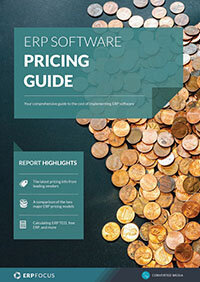
ERP Software Pricing Guide
Get the latest pricing information on over 80 popular ERP systems, and learn how to budget for your ERP project in our free guide
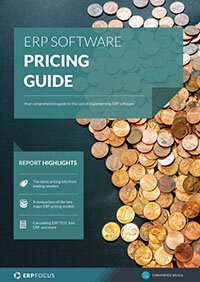
Featured white papers
-
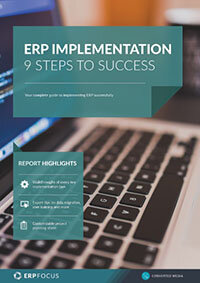
ERP Implementation: 9 steps to success
The 9 proven steps you should follow when implementing ERP
Download -
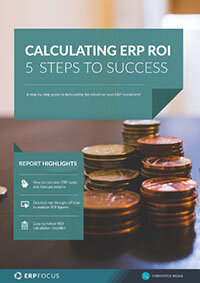
Calculating ERP ROI: 5 steps to success
Calculate your new ERP's financial benefits with this comprehensive guide
Download -
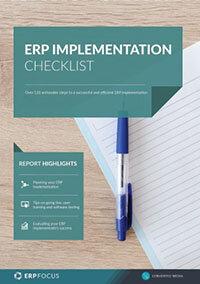
ERP Implementation Checklist
Over 120 actionable steps to implementing a new ERP successfully
Download
Related articles
-

How much does ERP cost? (Free ERP cost and budget guide)
How much does an ERP system cost in 2025? Everything you need to make an ERP software budget
-

Secret KPI: Why Your ERP Implementation Team Matters More Than Software
Learn how Godlan ensures successful ERP implementation for manufacturers with proven strategies &...
-

The case for multi-tier ERP implementations
Learn more about multi-tier ERP implementation and why you might need one

